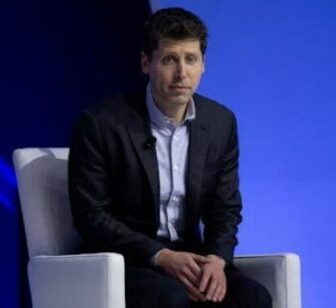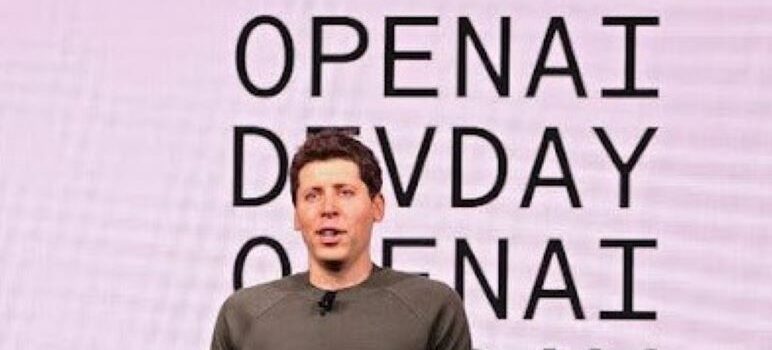Sam Altman was reinstated late Tuesday as OpenAI’s chief executive, the company said, successfully reversing his ouster by OpenAI’s board last week after a campaign waged by his allies, employees and investors.
The company’s board of directors will be overhauled, jettisoning several members who had opposed Altman. Adam D’Angelo, the chief executive of Mountain-view based Quora, will be the only holdover.
OpenAI had an “agreement in principle” for Altman to return as chief executive, it said in a post to X at 10:01pm Tuesday, Pacific Time. “We are collaborating to figure out the details. Thank you so much for your patience through this.”
The return of Altman and Greg Brockman, the company’s president who had resigned in solidarity, and the remaking of the board, capped a frenetic five days that upended OpenAI, the maker of the ChatGPT chatbot and one of the world’s highest-profile artificial intelligence companies.

Sam Altman at the Asia-Pacific Economic Cooperation summit last week. Carlos Barria, Reuters via The New York Times
“I love openai, and everything i’ve done over the past few days has been in service of keeping this team and its mission together,” Altman said in a post to X seven minutes after the company post, adding that he looked forward to reinforcing OpenAI’s partnership with Microsoft, its biggest investor.
OpenAI’s revamped board of directors will include Bret Taylor, an early Facebook officer and former co-chief executive of San Francisco-based Salesforce; Lawrence Summers, the former Treasury secretary; and D’Angelo, a current board member and chief executive of the question-and-answer site, Quora.
Taylor will act as board chairman, the company said.
Microsoft supported the move. Satya Nadella, Microsoft’s chief executive, said on X that he was “encouraged by the changes to OpenAI board,” calling it a “first essential step on a path to more stable, well-informed, and effective governance.” Nadella’s comment was posted one minute after Altman’s, with a retweet of the reinstated CEO’s comment.
D’Angelo was leading the negotiations, according to two people in touch with the board. The general framework for the changes was in place by late Sunday, one of those people said.
Determining the composition of the board slowed down the decision to bring Altman back, according to that person and one other. OpenAI called the new board its “initial” board, indicating it could expand.
A person close to the board’s deliberations on Tuesday said that D’Angelo, Tasha McCauley and Helen Toner pressed for certain concessions from Altman, including an independent investigation into his leadership of OpenAI.
In the end, Toner and McCauley agreed to step down from the board because it was clear that it needed a fresh start, this person close to deliberations said. If all of them stepped down, they worried that it would suggest the board erred even though they collectively felt they did the right thing, this person said.
The outgoing board focused on curbing Altman’s power. In addition to an investigation into his leadership, they blocked his and Brockman’s return to the board and objected to potential board members who they worried might not stand up to Altman, said this person close to the board negotiations.
OpenAI’s board surprised Altman and the company’s employees on Friday afternoon when it told him he was being pushed out. Brockman, who co-founded the company with Altman and others, resigned in protest.
The ouster kicked off efforts by Altman, 38, his allies in the tech industry and OpenAI’s employees to force the company’s board to bring him back. On Sunday evening, after a weekend of negotiations, the board said it was going to stick with its decision.
But in a head-spinning development just hours later, Microsoft said that Altman, Brockman and others would be joining the company to start a new advanced artificial intelligence lab.
Most of OpenAI’s more than 700 employees signed a letter telling the board they would walk out and follow Altman to Microsoft if he wasn’t reinstated, putting the future of the start-up in jeopardy.
Four board members — Ilya Sutskever, an OpenAI founder; D’Angelo; Toner, a director of strategy at Georgetown’s Center for Security and Emerging Technology; and McCauley, an entrepreneur and computer scientist — had initially decided to push Altman out.
But as the employee revolt grew, Sutskever had second thoughts: “I deeply regret my participation in the board’s actions,” he said in a message on X. He also signed the letter. Sutskever is no longer on the board but remains an OpenAI employee.
“Ilya is thrilled that Sam is back as C.E.O. and he has been working tirelessly for days to make this happen,” said Sutskever’s lawyer, Alex Weingarten. “It is what is best for the company.”
OpenAI employees had been given this week off for Thanksgiving, but many workers remained in the office or glued to their screens to follow the drama. “Thank god,” one employee said. “We’re so back,” said another.
Thrive Capital, which is leading a new funding offer that will value OpenAI at more than $80 billion, said it would continue to partner with the company “now and in the future.”
Late on Tuesday night, OpenAI employees were celebrating in the company’s office. Altman phoned a reporter at The New York Times and said: “I hope you have a lovely Thanksgiving.”
What Happened?
The abrupt ouster of Altman on Friday as chief executive of OpenAI, one of the world’s most prominent A.I. companies and the maker of ChatGPT, set off a head-spinning series of twists that culminated late Tuesday with Altman’s reinstatement at the company he founded and pledges to overhaul the way OpenAI is run.
The turmoil highlighted an unresolved debate over artificial intelligence, which many see as the most important new technology since web browsers but also a potential source of danger if misused.
What kicked it off
On Friday, Altman was dismissed as OpenAI’s chief executive. A dispute with a colleague appears to have played a role.
Ilya Sutskever, a board member who founded OpenAI with Altman and several others, was said to be growing alarmed that the company’s technology could pose a significant risk, and that Altman was not paying close enough attention to the potential harms. He and three other members of OpenAI’s six-member board decided to dismiss Altman.
The board was tight-lipped about its reasons, noting only that Altman “was not consistently candid in his communications with the board.” Greg Brockman, OpenAI’s president who along with Altman also served on the company’s board, quit in protest.
Five days of chaos
The firing led to confusion among employees at OpenAI, and distress among the company’s investors. Microsoft, which has invested $13 billion in the company, was said to be particularly alarmed and with other investors pressed the board over the weekend to reinstate Altman, without success.
On Sunday evening, after 48 hours of furious negotiations over the company’s future, OpenAI’s board said it would stand by its decision and named the second interim chief in two days: Emmett Shear, a former executive at Twitch, would succeed Mira Murati, a longtime OpenAI executive who had been appointed interim chief on Friday.
Late Sunday, Satya Nadella, Microsoft’s chief, announced that he intended to hire Altman and Brockman to lead an advanced A.I. research team at the tech giant.
By Monday morning, almost all of OpenAI’s nearly 800 employees had signed a letter saying they might quit to join Microsoft unless the start-up rehired Mr. Altman and all of the company’s board members resigned.
Late Tuesday, OpenAI announced an “agreement in principle” for Altman to return as chief executive of OpenAI, the culmination of the campaign waged by his allies, employees and investors. Brockman also returned to the company. “We are so back,” he posted on X, along with a selfie in front of a crowd of OpenAI employees, who celebrated in the company’s office.
Altman and Brockman rejoin a changed company, starting with the board that ousted them.
Who’s in, who’s out
OpenAI now has a fundamentally different, three-member board. The company described the reshuffle as a “new initial board,” suggesting more members may be coming.
Nadella of Microsoft said that he was “encouraged” by the changes, calling it a “first essential step on a path to more stable, well-informed, and effective governance.”
Incoming members:
- Bret Taylor, the former co-chief executive of Salesforce, an enterprise software company, will serve as OpenAI’s chairman. Taylor is also former chairman of Twitter, and was in the middle of last year’s clashes with Elon Musk, who initially agreed to acquire Twitter and then tried to back out of the deal. (Mr. Musk was a founder of OpenAI in 2015, but left the company three years later.)
- Lawrence Summers, a former Treasury secretary, Harvard professor and veteran of the Clinton and Obama administrations, remains a prominent economic voice in Washington.
Departing members:
- Sutskever, OpenAI’s chief scientist, who was a major player in the ouster of Altman.
- Tasha McCauley, an entrepreneur, computer scientist and adjunct senior management scientist at the RAND Corporation. She has ties to the Rationalist and Effective Altruist movements, a community that is deeply concerned that A.I. could one day destroy humanity.
- Helen Toner, a director of strategy at Georgetown University’s Center for Security and Emerging Technology. She also has links to the Rationalist and Effective Altruist movements, and had attracted Altman’s scorn with a paper she had co-written recently. Altman complained that the research paper seemed to criticize OpenAI’s efforts to keep its A.I. technologies safe.
Remaining members:
- Adam D’Angelo, chief executive of Quora, the question-and-answer site. He was among those who pushed Altman out, but then over the weekend led the talks to bring him back, according to two people in touch with the board.
Future of A.I.?
The upheaval at Open AI highlighted an industry split between so-called doomers, who say the technology is moving too quickly, and others who argue it can make lifesaving enhancements.
More than 1,000 tech leaders signed a letter in March calling for a pause in the development of A.I.’s most advanced systems, saying the tools have “profound risks to society and humanity.”
Altman, who did not sign that letter, has urged responsible management of A.I. while also promoting the technology, and in recent months pitched ideas to investors and others.
Cade Metz, Mike Isaac, Tripp Mickle, Karen Weise and Kevin Roose are reporters with The New York Times.
New York Times reporters John Koblin, Kevin Granville, Jason Karaian, and J. Edward Moreno contributed reporting. Copyright 2023, The New York Times.


AI does not exist.